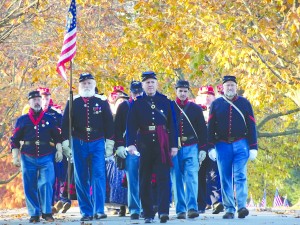Phil DeMaria was standing guard over an army camp one night, talking with the other guard on duty, watching over a trench full of men, some asleep, some awake. The moon was shining down; the camp was quiet.
Then, suddenly, a man rose out of the trench.
The moonlight on him, the night peaceful. DeMaria and his fellow guard fell quiet. The man, standing in the dark, began to sing.
DeMaria is the captain of the Rhode Island living history group, Battery B First Rhode Island Light Artillery. He feels a deep connection to the people he and his group portray, so much so that he is often nearly moved to tears at moments during a reenactment or demonstration.
The group portrays a real Rhode Island battalion that fought during the American Civil War; its reenactments and other events often include a demonstration of light artillery. The battalion was documented heavily in the aftermath of the Civil War by one of the soldiers’ sons, who became fascinated by the war and the company after his father, Sgt. Albert Strait, died in the war, DeMaria said.
This man’s steadfast documentation, of diaries, photographs and other artifacts that might have otherwise been lost to history, has allowed Battery B to be among the most knowledgeable groups in the region, in regard to their group’s real-life stories.
“We almost feel like we know these guys,” DeMaria said.
DeMaria got his start in living history portrayals and reenacting in the late 1970s, after he and his wife attended a reenactment in Virginia. It was his first encounter with any sort of living history demonstration, and he inquired about a group when he returned home to Rhode Island.
There was no group here, but he joined one in Massachusetts. Eventually, though, he said he became more interested in doing historical education components, and they split off and formed their own group, grounded in the real Battery B.
own group, grounded in the real Battery B.
Education is a big piece of what DeMaria views as the group’s objective.
“In no way are we trying to glorify war,” DeMaria said. “…[We try] to understand the sacrifices.”
“Most of them [the soldiers] were kids,” DeMaria continued, noting that many of those in Battery B were in their late teens or early 20s. Bringing those people to life, as breathing, thinking, feeling people, is what he feels is an important piece of a living history demonstration.
“The only way you can experience it is by living it,” he said. The spectators learn about the war, but he stressed that the reenactors do as well. “We, in turn, are learning by experiencing it,” he said.
For DeMaria, the history of the event is paramount. He views the work of reenactors, living history events, as integral to ensuring that an event like the Civil War remains in the past.
“We can’t erase what happened, but if we teach it, people will realize we can never let it happen again,” he said.
However, he stated that the Confederate flag and other items depicting the nation’s violent past were not “symbols of hate.” He feels those who participate in reenactments on the Confederate side do not identify with “what happened,” but rather want “to honor their relatives.”
The use of the Confederate flag by racist organizations like the Ku Klux Klan, he feels, is not indicative of its meaning.
“Unfortunately, other organizations have taken that symbol and used it,” he said, in reference to recent neo-Nazi and white supremacist marches in Charlottesville. The KKK and other organizations like it are part of “a lot of bad things that came out of [the Civil War],” he said.
The Civil War events he goes to and participates in can draw thousands of spectators, he said, and though interest ebbs and flows, often sparking with relevant TV shows or other media, engagement with the war typically remains high.
“The Revolutionary War gave us our independence,” he said. “The Civil War made us who we are. Good or bad, it made us who we are.”
DeMaria has been part of Battery B for 25 years. He said part of his challenge can be motivating the all-volunteer group, especially in an artillery company like Rhode Island’s, which requires at least eight men to operate, whereas an infantry company can basically operate as individuals.
At actual events, reenactment groups will come together to “live exactly the way they did,” camping out, mimicking command structures and sleeping in trenches. At night, he said, there are often dances, “civilians” walking around and all variety of events happening at any time.
“You never know what you’re going to see,” DeMaria said.
DeMaria’s favorite part, however, is what he calls “magic moments.” That night, standing guard over the trenches, was one of his. He and his fellow guard quiet, the camp mostly asleep.
And a man, climbing out of the trenches into the open night air, who began to sing a sweet, sad song.
For more information about Battery B First Rhode Island Light Artillery and their upcoming events, visit batterybri.org/index.html.